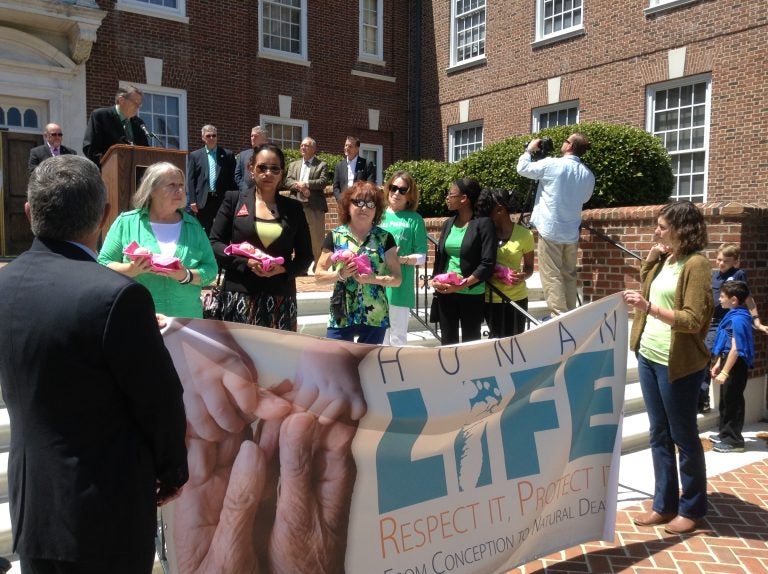Delaware bill calls for banning abortions after 20 weeks
The legislation would prohibit abortion after 20 weeks unless a medical professional deems the procedure necessary for the health of the mother.

Delaware legislators have proposed a bill that aims to prevent abortions after 20 weeks. (Zoe Read/WHYY)
Delaware legislators introduced a bill Tuesday calling for a ban on abortion after 20 weeks of pregnancy.
Dubbed the “Pain Capable Unborn Child Protection Act” and sponsored by state Sen. Bryant Richardson and state Rep. Tim Dukes, both R-Laurel, the measure asserts that, at 20 weeks, a fetus can feel pain and survive outside the womb.
The legislation would prohibit abortion after that mark unless a medical professional deems the procedure necessary for the health of the mother.
“We’re talking about 20 weeks to make up your mind if you’re going to carry that child or not. It’s not saying a woman doesn’t have right to choose,” Richardson said.
“The doctor has to be careful about deciding the gestation age of the unborn. Do we get that in our abortion clinics in Delaware? I don’t think so,” he said. “I think, a lot of times, women spend very little time with a so-called doctor, and the decisions are made very rapidly, and the doctor doesn’t do anything to follow through with the woman.”
Last year, the General Assembly passed legislation that protects a woman’s right to choose by ensuring abortion will remain legal in Delaware if the U.S. Supreme Court abortion ruling, Roe v. Wade, were overturned.
The amended law allows abortion before a fetus reaches viability — but allows abortion after that point if a doctor determines it’s necessary for the health of the mother or if the baby is not likely to survive without extraordinary medical measures.
Opponents argued that the definition of viable is too vague, leaving room for a doctor to perform late-term abortions.
State Sen. Bryan Townsend, D-Newark, who sponsored last year’s legislation, said he believes Richardson’s bill would undo the codification of a woman’s right to choose under Roe v. Wade.
What’s more, the new measure is not based on medical science or constitutional rights, he said.
“I think it would move us in a backward direction from where Delawareans want to be, which is a balanced set of rights,” Townsend said.
“Before viability, a woman has a right to choose, and after viability there are restrictions on that right. Sen. Richardson’s legislation represents something we represented last year as an amendment and we struck it down, and nothing’s changed since then.
“It’s not what the Legislature wants, it’s not what the people of Delaware broadly want, and I think we’ve had this debate and need to move forward,” Townsend continued.
Dr. Donna J. Harrison, executive director of the American Association of Pro-Life Obstetricians and Gynecologists, said an infant can survive outside the womb at 20 weeks. After that, she said, abortion requires mutilation of the fetus.
Doctors should perform a C-section in an effort to save the child, said Harrison, whose group represents about 4,000 OB-GYNs.
“This is a choice about living human beings being killed in a very brutal way. Fetuses 20 weeks and beyond are capable of feeling pain,” she said.
“Fetuses who are victims of abortion react to painful stimuli with the same physiological responses as any other human being would display — an increase in heart rate, an increase in stress hormones in the blood stream and a withdrawal from painful stimuli.”
The American Congress of Obstetricians and Gynecologists — which reports it represents more than 57,000 OB-GYNs — states on its website a human fetus “does not have the capacity to experience pain until after viability. Rigorous scientific studies have found that the connections necessary to transmit signals from peripheral sensory nerves to the brain, as well as the brain structures necessary to process those signals, do not develop until at least 24 weeks of gestation.
“Because it lacks these connections and structures, the fetus does not even have the physiological capacity to perceive pain until at least 24 weeks of gestation.”
Ruth Lytle-Barnaby, president and CEO of Planned Parenthood of Delaware, said only 0.5 percent of abortions occur after 20 weeks. She said these abortions may occur due to a fetal anomaly not previously detected, life of the mother, rape or incest.
“Women’s reproductive choices and rights seem to be relegated to legislation and court. It is absolutely unacceptable,” Lytle-Barnaby said. “These decisions need to be made between women and their doctors, not legislators who have no relationship to what women’s real lives are. It saddens me we’re still fighting the same battles we fought 50, 60, 70, 80, 90, 100 years ago.”
Richardson’s bill states anyone who “intentionally or recklessly” performs an abortion in violation of the act would be guilty of a felony.
WHYY is your source for fact-based, in-depth journalism and information. As a nonprofit organization, we rely on financial support from readers like you. Please give today.





